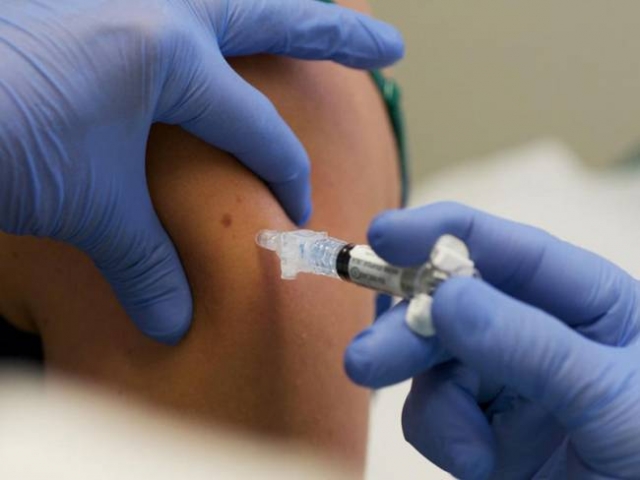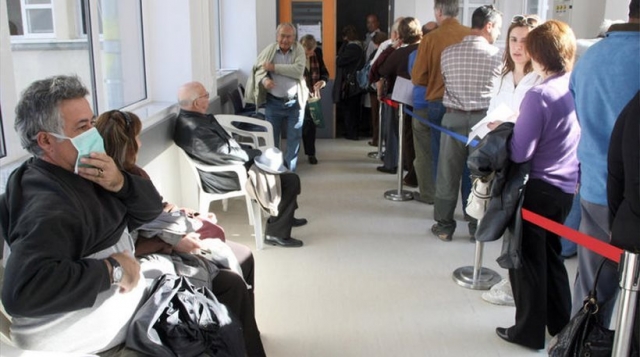Over the past two weeks, two or three people a day have died from flu. By Wednesday morning, the number of death cases reached 64. It should be noted that the deceased had been vaccinated despite the fact that they were ill and despite the recommendations of doctors.
At the same time, the number of people admitted for treatment in intensive care wards because of flu is exponentially growing. 10 patients were admitted from 10:00 am to 2:00 pm today alone.
Experts recommend that everyone who has flu symptoms and belongs to the high-risk group, i.e. suffers from morbid obesity or any serious disease, should see his or her doctor and immediately begin antiviral therapy. Antiviral medicines are sold by hospital pharmacies against a prescription.
It is noted that the average age of the people who died from influenza is 57 years. The majority of them suffered from obesity or diabetes, or had problems with the respiratory or cardiovascular system.
Athens Medical Association informs of shortage of influenza vaccines
According to the Association, this year 40% of the Greeks belonging to high-risk groups are at risk because they have failed to be vaccinated. "It is tragic that people die for failing to buy a vaccine that costs 6 euro," doctors stress.

According to the Medical Association, the majority of pharmacists state that this is due to the fact that the quantities supplied are much smaller than the quantities ordered. Moreover, no vaccines have been allocated to the wards of the national organization for the provision of health services.
"The situation reached an impasse in early January when the epidemic in the country began and there were no vaccines to be provided for the people at risk at least," states the Medical Association, emphasizing that the vaccine is effective for three months, which had significantly increased the requirements of the country in early January, as even those who had been vaccinated in October remained unprotected.
Athens Medical Association defines as criminal the lack of immunization policy in Greece in relation to the importance of prevention of seasonal flu, due to which the vaccination status of the population is low. It also pays attention to the distortion of scientific data by non-experts, which in previous years had scared people with unscientific fears of "possible complications" as a result of vaccination, thus becoming the cause for thousands of people to remain at risk of the flu epidemic.
The Association urges all its member doctors to be on the alert and recommends to their patients prevention measures and appropriate antiviral treatment to limit the spread of the virus as much as possible.

In its communication, Athens Medical Association notes that the prevention and protection of both patients and healthy individuals should be completed every year through a targeted national prevention strategy. The Association also adds that vaccination is the most effective and cost-efficient way for the state to keep its citizens healthy and avoid deadly diseases.
Free antiviral medicines against influenza in hospital pharmacies
Due to the increased number of people suffering from swine flu H1N1, the pharmacies will grant free antiviral medicines. In its communication pharmaceutical company Roche Hellas confirms that all kinds of Tamiflu antiviral medicine (capsules and powder for oral suspension) are smoothly distributed through the relevant channels, namely pharmaceutical warehouses, pharmacies in public hospitals and private clinics with more than 60 beds.
This year's epidemic goes along with a significant number of serious cases, that of patients admitted to intensive care wards being 59 up until yesterday and of those who died 55. The majority of them were people from high-risk groups who suffered from chronic diseases.
As noted by the Centre for Disease Prevention and Control, early antiviral therapy reduces the likelihood of complications.
Centre for Disease Prevention and Control: Insufficient information
According to head of the Centre for Disease Prevention and Control Jenny Kourea-Kremastinou, one of the reasons for the spreading of the flu is the fact that this year the population was not appropriately informed. "This year the funding for public health issues was not enough and consequently the Centre for Disease Prevention and Control was unable to conduct an information campaign," she states.

"Investing money in prevention for both the population and the medical staff and in informing them is essential to the preservation of personal and public health. It is much more useful even from a financial point of view because the state "saves" significant costs by avoiding expensive hospital treatments, additional employment of medical staff, use of medicines and medical supplies, loss of man-hours and reduced productivity due to absence from work, etc." emphasizes Jenny Kourea-Kremastinou.
As she notes, "Minister of Health Adonis Georgiadis is trying to protect this global principle by seeking financial support for the Centre for Disease Prevention and Control to enable it to play its role properly."
It should be noted that in other European countries the percentage of vaccinated individuals belonging to high-risk groups is almost 70% whereas it reaches just 30% in Greece.